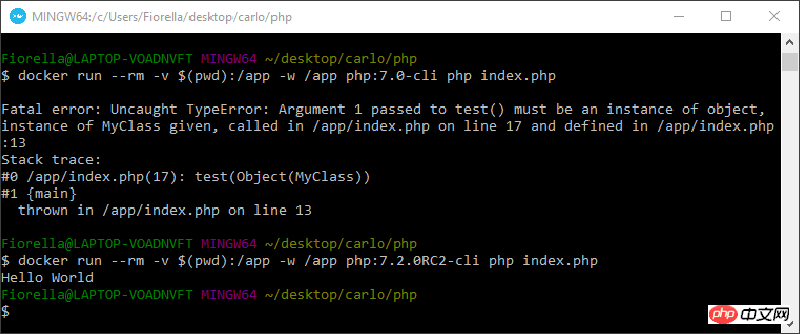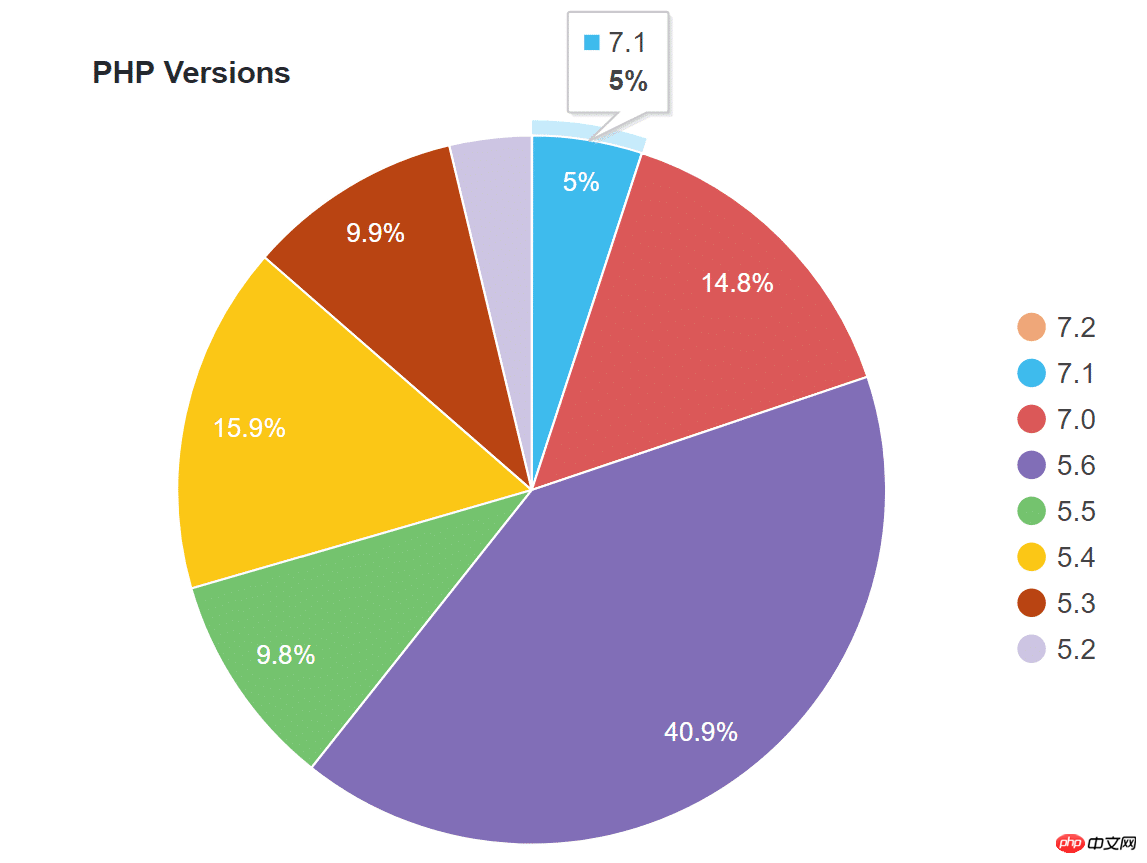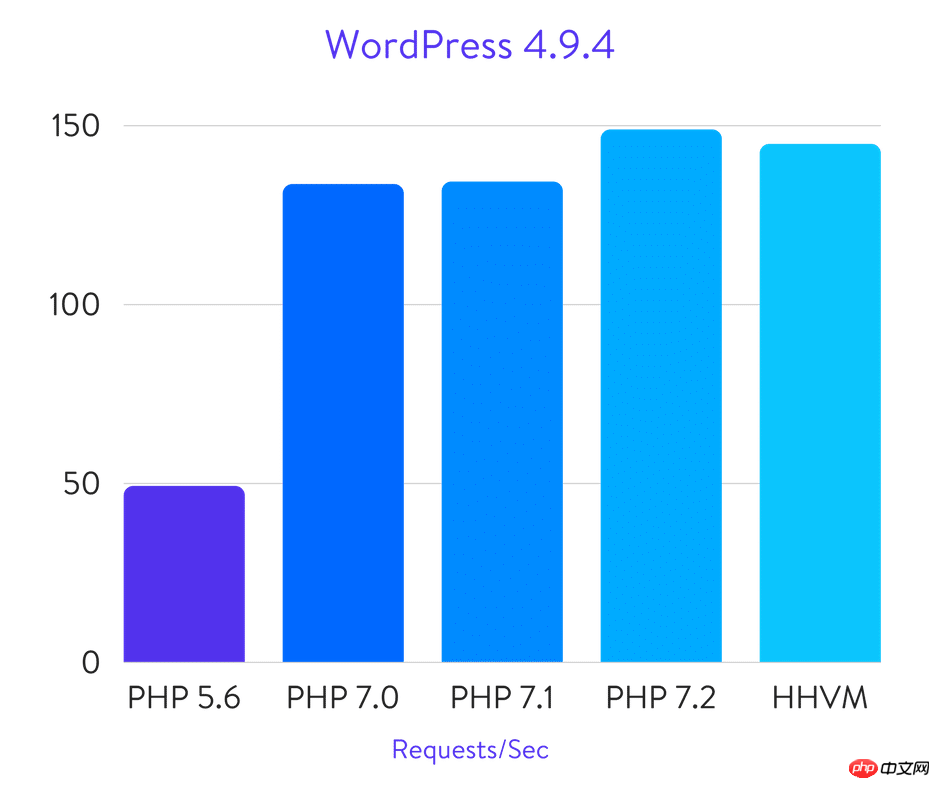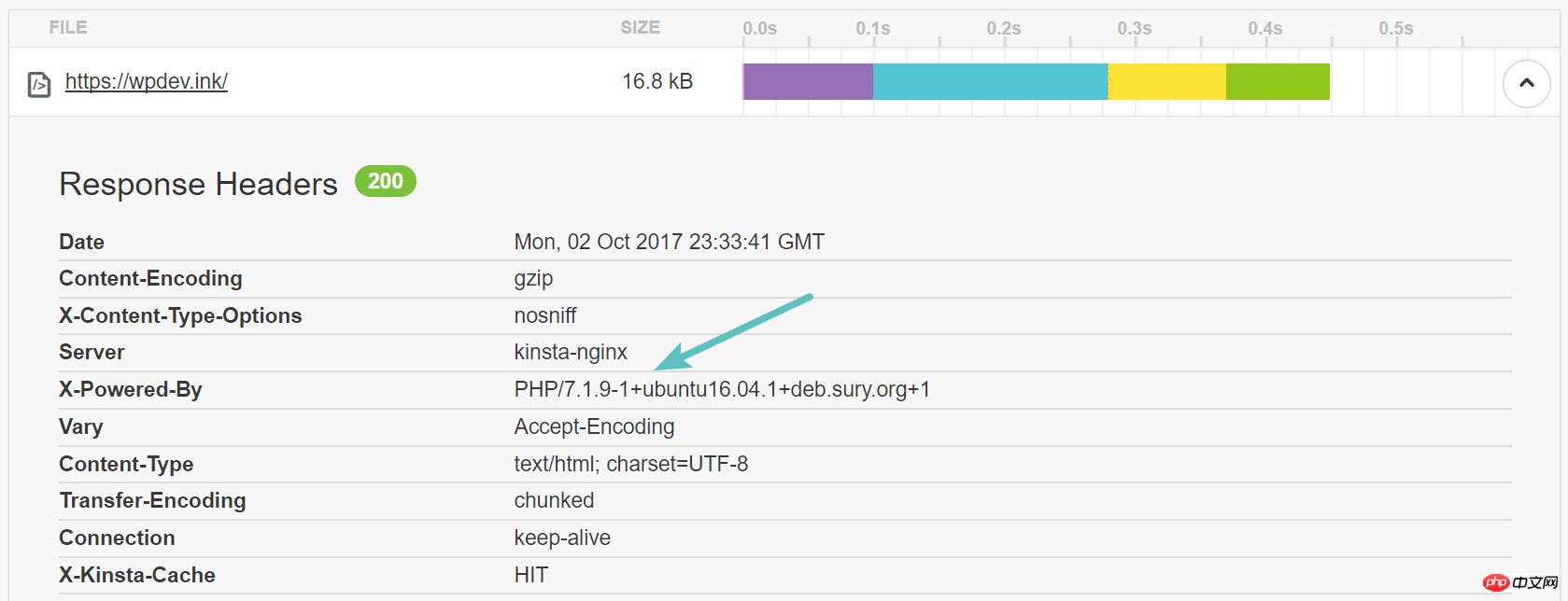PHP 7.2 new features introduction
The content of this article is about the introduction of the new features of PHP 7.2, which has certain reference value. Friends in need can refer to it
PHP 7.2 has been officially released on November 30, 2017 . This release includes new features, functionality, and optimizations to help us write better code. In this article, I will introduce some of the most interesting language features of PHP 7.2.
You can view the complete list of changes on the Requests For Comments page.
Core improvements
Parameter type declaration
Since PHP5, we can specify the expected declaration type of function parameters. If the wrong type of argument is passed, PHP will throw an error.
Parameter type declaration (also called type hint) specifies the parameter type expected to be passed to a function or class method.
Here is an example:
class MyClass {
public $var = 'Hello World';
}$myclass = new MyClass;function test(MyClass $myclass){
return $myclass->var;
}echo test($myclass);In this code, the test function requires a MyClass instance. Incorrect parameter data types result in a fatal error.
Fatal error: Uncaught TypeError: Argument 1 passed to test() must be an instance of MyClass, string given, called in /app/index.php on line 12 and defined in /app/index.php:8
Since PHP 7.2 type hints can be used on object data, and this improvement allows generic object types to be used as parameters of a function or method. Here's an example:
class MyClass {
public $var = '';
}class FirstChild extends MyClass {
public $var = 'My name is Jim';
}class SecondChild extends MyClass {
public $var = 'My name is John';
}$firstchild = new FirstChild;$secondchild = new SecondChild;function test(object $arg) {
return $arg->var;
}echo test($firstchild);echo test($secondchild);In the above example, we called the test function twice, passing a different object each time. This was unprecedented in previous versions of PHP.

Testing type hints for PHP 7.0 and PHP 7.2 in Docker.
Object return type declaration
If the variable type specifies the expected type of the function parameter, the return value type can also be specified as the expected type.
Return type declaration specifies the expected type that a function should return.
Since PHP 7.2, object data types can be declared using return types. Here’s an example:
class MyClass {
public $var = 'Hello World';
}
$myclass = new MyClass;function test(MyClass $arg) : object {
return $arg;
}
echo test($myclass)->var;Previous PHP versions would throw the following fatal error:
Fatal error: Uncaught TypeError: Return value of test() must be an instance of object, instance of MyClass returned in /app/index.php:10
Of course, the PHP 7.2 code would print ‘Hello World’.
Parameter type generalization
PHP currently does not allow any difference in the parameter type of a subclass and its parent class or interface. What does it mean?
Refer to the following code:
<?phpclass MyClass {
public function myFunction(array $myarray) { /* ... */ }
}class MyChildClass extends MyClass {
public function myFunction($myarray) { /* ... */ }
}Here we omit the parameter type in the subclass. In PHP 7.0, the following warning is produced:
Warning: Declaration of MyChildClass::myFunction($myarray) should be compatible with MyClass::myFunction(array $myarray) in %s on line 8
As of PHP 7.2, we can ignore types in subclasses without breaking any code. This solution allows us to upgrade a class in the library to use type hints without having to update all its subclasses.
Trailing commas in list syntax
Using a trailing comma on the last element of a PHP array is legal syntax, and is sometimes encouraged to easily avoid adding new elements. A missing comma error occurred. Since PHP 7.2 in grouping namespaces we can use trailing commas.
See Trailing Commas in List Syntax for a feel for the RFC and some sample code.
Security Improvements
Argon2 in Password Hashing
Argon2 is a powerful hashing algorithm that won the championship in the 2015 Password Hash Algorithm Competition. PHP 7.2 will As a replacement for the secure Bcrypt algorithm.
The new version of PHP has introduced the PASSWORD_ARGON2I constant, which can now be used in the password_* series of functions:
password_hash('password', PASSWORD_ARGON2I);
Unlike Bcrypt, which only uses one cost factor, Argon2 uses three cost factors to differentiate as follows:
Defines the amount of memory overhead in KiB that should be consumed during hash calculation (default is 1 << 10 or 1024 KiB or 1 MiB)
Define the time cost of the number of iterations of the hash algorithm (the default value is 2)
Parallel factor, used to set the number of parallel threads used in hash calculations (the default value is 2) )
The following three new constants define the default cost factors:
PASSWORD_ARGON2_DEFAULT_MEMORY_COST
PASSWORD_ARGON2_DEFAULT_TIME_COST
- ##PASSWORD_ARGON2_DEFAULT_THREADS
$options = ['memory_cost' => 1<<11, 'time_cost' => 4, 'threads' => 2]; password_hash('password', PASSWORD_ARGON2I, $options);See Argon2 Password Hashing for more information. Libsodium becomes part of PHP core Starting with version 7.2, PHP includes the Sodium library in its core. Libsodium is a cross-platform and cross-language library for encryption, decryption, signing, password hashing, and more.
This library was previously provided through PECL.
For a list of Libsodium functions, see Quick Start.
See also PHP 7.2: The first programming language to add modern cryptography to its standard library.
__autoload function in PHP 5.1 has been replaced by spl_autoload_register. A deprecation notice will now be reported during compilation.
$php_errormsg local variable will be created. In PHP 7.2, error_get_last and error_clear_last should be used instead.
create_function() You can create a function with a function name and pass in the function parameters and function body as a list of the function. Because of security issues and poor performance, it is marked as deprecated and encapsulation is encouraged instead.
mbstring.func_overload Setting ini to a non-zero value has been marked as deprecated.
(unset) cast is an expression that always returns null and is useless.
If the second parameter is passed in, parse_str() will parse the query string into an array, otherwise it will parse into the local symbol table. For security reasons, it is not recommended to dynamically set variables in function scope, and using parse_str() without a second argument will throw a deprecation notice.
gmp_random() is platform dependent and will be deprecated. Use gmp_random_bits() and gmp_random_rage() instead.
each() Iterating over an array behaves very much like foreach(), but foreach() is a better choice for a few reasons, such as being 10 times faster. Using the former in a loop will now throw a deprecation prompt.
assert() The function checks the given assertion and performs related processing when the result is FALSE. assert() with a string parameter is now deprecated due to an RCE vulnerability. The zend.assertion ini option turns off assertion expressions.
$errcontext is an array containing local variables when an error occurs. It can be used as the last parameter of the error handler set_error_handler() function.
What does PHP 7.2 mean for WordPress users?
According to the official WordPress statistics page, as of this writing, only 19.8% of WordPress users have upgraded to PHP 7. Only 5% use PHP 7.1. You can see that more than 40% of users are still using PHP 5.6, and what’s even more frightening is that more than 39% of users are using a version of PHP that is no longer supported. As of December 2016, WordPress.org changed the official recommendation for users of PHP 5.6 to recommend using PHP 7 or above. 
WordPress PHP 7.1 Statistics
The above data performance is not pleasant, because it seems that PHP 7 seems to be faster. Here are some statistics:
PHP official benchmarks show that PHP 7 allows the system to perform 2 requests per second, which is almost just average latency compared to PHP 5.6.
Christian Vigh also published a PHP performance test comparison. He found that PHP 5.2 is nearly 400% slower than PHP 7.
We ran performance benchmarks PHP 5.6 vs PHP 7 vs HHVM in 2018. Similar to the benchmark above, we found that PHP 7.2 can perform almost three times the number of transactions (requests) per second compared to PHP 5.6.

WordPress Benchmark
WordPress 4.9.4 PHP 5.6 Benchmark Result: 49.18 req/sec
WordPress 4.9.4 PHP 7.0 Benchmark Result: 133.55 req/sec
WordPress 4.9.4 PHP 7.1 Benchmark Result: 134.24 req/sec
WordPress 4.9.4 PHP 7.2 Benchmark Result: 148.80 req/sec �
WordPress 4.9.4 HHVM Benchmark Result: 144.76 req/sec
Many things are slower to just update because of the time it takes to get involved in testing all new third-party plugins and themes to make sure they work properly. A lot of times, it's slow because they're not done yet. Not sure what version of PHP you're running? One of the easiest ways is to use the tool Pingdom or Google Chrome development tools. The first HTTP request header will usually display your version.

Check PHP version
This will rely on the host not modifying the value of the X-Powered-By header. If it is modified, you may not be able to see the PHP version information. In this case, you need to upload the PHP 7.2 new features introduction via FTP. Or you always ask the host.
Upgrade to PHP 7.2
PHP 7.2 is still partially unfinished, but you can try it out first. You can test your WordPress local site or check your scripts in a Docker-like environment, and you can test and compare different PHP versions from the command line.
Conclusion
Ready to switch to PHP 7.2? But at least hopefully you've transitioned to PHP 7 or higher first. If you're not ready to test it now, upgrade your scripts, review your code, and talk about your first experience with PHP 7.2.
Related recommendations:
Compile php7.2 under windows and extremely extended judy
How to install php7.2 on linux
CentOS7yum installation PHP7.2 instance method
The above is the detailed content of PHP 7.2 new features introduction. For more information, please follow other related articles on the PHP Chinese website!

Hot AI Tools

Undress AI Tool
Undress images for free

Undresser.AI Undress
AI-powered app for creating realistic nude photos

AI Clothes Remover
Online AI tool for removing clothes from photos.

Clothoff.io
AI clothes remover

Video Face Swap
Swap faces in any video effortlessly with our completely free AI face swap tool!

Hot Article

Hot Tools

Notepad++7.3.1
Easy-to-use and free code editor

SublimeText3 Chinese version
Chinese version, very easy to use

Zend Studio 13.0.1
Powerful PHP integrated development environment

Dreamweaver CS6
Visual web development tools

SublimeText3 Mac version
God-level code editing software (SublimeText3)
 Fixed: Windows Update Failed to Install
Aug 08, 2025 pm 04:16 PM
Fixed: Windows Update Failed to Install
Aug 08, 2025 pm 04:16 PM
RuntheWindowsUpdateTroubleshooterviaSettings>Update&Security>Troubleshoottoautomaticallyfixcommonissues.2.ResetWindowsUpdatecomponentsbystoppingrelatedservices,renamingtheSoftwareDistributionandCatroot2folders,thenrestartingtheservicestocle
 Fix: Ethernet 'Unidentified Network'
Aug 12, 2025 pm 01:53 PM
Fix: Ethernet 'Unidentified Network'
Aug 12, 2025 pm 01:53 PM
Restartyourrouterandcomputertoresolvetemporaryglitches.2.RuntheNetworkTroubleshooterviathesystemtraytoautomaticallyfixcommonissues.3.RenewtheIPaddressusingCommandPromptasadministratorbyrunningipconfig/release,ipconfig/renew,netshwinsockreset,andnetsh
 How to work with arrays in php
Aug 20, 2025 pm 07:01 PM
How to work with arrays in php
Aug 20, 2025 pm 07:01 PM
PHParrayshandledatacollectionsefficientlyusingindexedorassociativestructures;theyarecreatedwitharray()or[],accessedviakeys,modifiedbyassignment,iteratedwithforeach,andmanipulatedusingfunctionslikecount(),in_array(),array_key_exists(),array_push(),arr
 Compare and contrast PHP Traits, Abstract Classes, and Interfaces with practical use cases.
Aug 11, 2025 pm 11:17 PM
Compare and contrast PHP Traits, Abstract Classes, and Interfaces with practical use cases.
Aug 11, 2025 pm 11:17 PM
Useinterfacestodefinecontractsforunrelatedclasses,ensuringtheyimplementspecificmethods;2.Useabstractclassestosharecommonlogicamongrelatedclasseswhileenforcinginheritance;3.Usetraitstoreuseutilitycodeacrossunrelatedclasseswithoutinheritance,promotingD
 Describe the Observer design pattern and its implementation in PHP.
Aug 15, 2025 pm 01:54 PM
Describe the Observer design pattern and its implementation in PHP.
Aug 15, 2025 pm 01:54 PM
TheObserverdesignpatternenablesautomaticnotificationofdependentobjectswhenasubject'sstatechanges.1)Itdefinesaone-to-manydependencybetweenobjects;2)Thesubjectmaintainsalistofobserversandnotifiesthemviaacommoninterface;3)Observersimplementanupdatemetho
 How to use the $_COOKIE variable in php
Aug 20, 2025 pm 07:00 PM
How to use the $_COOKIE variable in php
Aug 20, 2025 pm 07:00 PM
$_COOKIEisaPHPsuperglobalforaccessingcookiessentbythebrowser;cookiesaresetusingsetcookie()beforeoutput,readvia$_COOKIE['name'],updatedbyresendingwithnewvalues,anddeletedbysettinganexpiredtimestamp,withsecuritybestpracticesincludinghttponly,secureflag
 phpMyAdmin security best practices
Aug 17, 2025 am 01:56 AM
phpMyAdmin security best practices
Aug 17, 2025 am 01:56 AM
To effectively protect phpMyAdmin, multiple layers of security measures must be taken. 1. Restrict access through IP, only trusted IP connections are allowed; 2. Modify the default URL path to a name that is not easy to guess; 3. Use strong passwords and create a dedicated MySQL user with minimized permissions, and it is recommended to enable two-factor authentication; 4. Keep the phpMyAdmin version up to fix known vulnerabilities; 5. Strengthen the web server and PHP configuration, disable dangerous functions and restrict file execution; 6. Force HTTPS to encrypt communication to prevent credential leakage; 7. Disable phpMyAdmin when not in use or increase HTTP basic authentication; 8. Regularly monitor logs and configure fail2ban to defend against brute force cracking; 9. Delete setup and
 Using XSLT Parameters to Create Dynamic Transformations
Aug 17, 2025 am 09:16 AM
Using XSLT Parameters to Create Dynamic Transformations
Aug 17, 2025 am 09:16 AM
XSLT parameters are a key mechanism for dynamic conversion through external passing values. 1. Use declared parameters and set default values; 2. Pass the actual value from application code (such as C#) through interfaces such as XsltArgumentList; 3. Control conditional processing, localization, data filtering or output format through $paramName reference parameters in the template; 4. Best practices include using meaningful names, providing default values, grouping related parameters, and performing value verification. The rational use of parameters can make XSLT style sheets highly reusable and maintainable, and the same style sheets can produce diversified output results based on different inputs.







